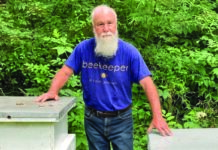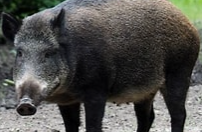From the Office of Public Affairs | http://www.news.ku.edu
Headlines
‘Potentially volcano-covered’ Earth-size planet found orbiting star first described by KU astronomer
LAWRENCE — It’s Earth-sized, volcano-studded (possibly) and orbiting the cusp of a “habitable zone” around a star 90 light years away in a solar system first detailed by an astronomer at the University of Kansas. Meet LP 791-18 d, a fascinating exoplanet circling a small red dwarf in the southern constellation Crater, described for the first time today in the peer-reviewed journal Nature. But don’t book your flight quite yet.
KU junior Audrey Rips-Goodwin, junior from Overland Park, is KU’s most recent Astronaut Scholar
LAWRENCE — Audrey Rips-Goodwin, an Overland Park junior in chemistry and mathematics who is minoring in psychology, is the University of Kansas’ most recent recipient of an Astronaut Scholarship — an award of up to $15,000. The Astronaut Scholarship was founded in 1984 by the six surviving members among the seven astronauts who were part of the Mercury program to encourage students to pursue scientific endeavors.
KU to host 2023 World Applied Anthropology Congress
LAWRENCE — The World Applied Anthropology Congress will meet at the University of Kansas Lawrence campus from May 31 to June 3. The WAAC is the inaugural flagship global meeting of the Anthropological Association for Humankind. Michael Crawford, professor emeritus of anthropology and founder of the Laboratory of Biological Anthropology at KU, will be honored during the event.
Full stories below.
————————————————————————
Contact: Brendan Lynch, KU News Service, 785-864-8855, [email protected], @BrendanMLynch
‘Potentially volcano-covered’ Earth-size planet found orbiting star first described by KU astronomer
LAWRENCE — It’s Earth-sized, volcano-studded (possibly) and orbiting the cusp of a “habitable zone” around a star 90 light years away in a solar system first detailed by an astronomer at the University of Kansas. Meet LP 791-18 d, a fascinating exoplanet circling a small red dwarf in the southern constellation Crater, described for the first time today in the peer-reviewed journal Nature.
But don’t book your flight quite yet.
According to co-author Ian Crossfield, associate professor of physics & astronomy at KU, the discovery of the exoplanet mostly tells us more about the inner workings of a system initially detailed in a 2019 paper where he served as lead author (as well as other systems like it).
“In this system, named LP 791-18 along with the star, the star is cooler and smaller than the sun,” Crossfield said. “It’s a system that was observed by NASA’s TESS Space Telescope a number of years back now. With TESS, we were able to identify that there were two planets in the system — LP 791-18 b and c. The system was interesting for a couple of reasons, partly because this was one of the smallest, coolest stars found to have planets of any kind. Most of the planets we know about are around stars like the sun. Also, these are easier to study in some ways. From the few other planetary systems we know about, these small, cool, red dwarfs sometimes are likely to host lots of planets.”
The new paper detailing LP 791-18 d relied on data from NASA’s Transiting Exoplanet Survey Satellite (TESS) and retired Spitzer Space Telescope, as well as a suite of ground-based observatories, and was led by Merrin Peterson, a graduate student at the Trottier Institute for Research on Exoplanets (iREx) based at the University of Montreal.
The researchers believe the freshly discovered planet “could see volcanic flare-ups about as frequently as Jupiter’s moon Io, the most volcanically volatile body in our solar system.”
According to NASA, the presence of volcanos could suggest planetary habitability. But Crossfield resists the temptation to speculate whether such a planet could support life.
“The main discovery here is that we found a planet the size of Earth, much smaller than the planets b and c,” he said. “It’d be just a bit hotter than, say, the Earth is — or, at least it receives more starlight from its star than we do from the sun. We don’t really know if it has an atmosphere, or if it has water, or if it has life, or if it could support life. We don’t know any of that.”
While some data suggest the scientifically exciting possibility that LP 791-18 d is a volcanically active planet, Crossfield said the idea remains hypothetical.
“We don’t know that there are any volcanoes here,” he said. “All we know is that this is a small planet that’s experiencing a straight-up periodic stretching due to its orbit around its star and near the other planets. That might cause lots of volcanoes like on Jupiter’s moon Io, which is the most volcanically active thing in our solar system. We know about that because we’ve sent things nearby and taken pictures. There’s not yet that kind of clear evidence yet with LP 791-18 d.”
Crossfield added the planet was scientifically fascinating regardless of its volcanism or potential to host life.
“People study Jupiter still, but they don’t do it because they think there are aliens living there,” he said. “People study asteroids — just because we can and because we learn new things. Lots of exoplanet science is just about learning interesting things about the universe.”
-30-
————————————————————————
The official university Twitter account has changed to @UnivOfKansas.
Refollow @KUNews for KU News Service stories, discoveries and experts.
Tweets by KUnews
————————————————————————
Contact: Erinn Barcomb-Peterson, KU News Service, 785-864-8858, [email protected], @ebpkansas
KU junior Audrey Rips-Goodwin, junior from Overland Park, is KU’s most recent Astronaut Scholar
LAWRENCE — Audrey Rips-Goodwin, an Overland Park junior in chemistry and mathematics who is minoring in psychology, is the University of Kansas’ most recent recipient of an Astronaut Scholarship — an award of up to $15,000.
“I am beyond grateful for the opportunity to be an Astronaut Scholar,” Rips-Goodwin said. “This scholarship will support me and allow me to focus on research in my fourth and fifth years. Becoming an Astronaut Scholar will allow me to grow professionally and learn from those at the top of their fields.”
The Astronaut Scholarship was founded in 1984 by the six surviving members among the seven astronauts who were part of the Mercury program as a means to encourage students to pursue scientific endeavors. Astronauts from the Mercury, Gemini, Apollo, Skylab and Space Shuttle programs have also joined the foundation.
This year, the foundation awarded 68 scholarships to students from 46 universities across the nation. Students interested in applying for the awards in future years should contact the Office of Fellowships.
Rips-Goodwin is the daughter of Cheryl Rips and Stanley Goodwin and is a graduate of Blue Valley Southwest High School. She plans to pursue a doctorate in neuroscience and conduct research in neuroscience/neuroeconomics of addictions, eating disorders and obesity.
In 2021, under Michy Kelly at the University of South Carolina, Rips-Goodwin contributed to a large series of studies examining how age-related increases in phosphodiesterase 11A4 contribute to age-related cognitive decline and Alzheimer’s disease. She is a co-author of a paper, currently in review, based on this research.
After transferring to KU in 2022, she joined Tera Fazzino’s lab and determined the accuracy of reported energy content of hyper-palatable foods, combining her research interests in both chemistry and psychology and leading to two presentations. In 2022, she was named a Kansas Idea Network of Biomedical Research Excellence program scholar to conduct independent research.
This summer, Rips-Goodwin is participating in a National Science Foundation Research Experience for Undergraduates in the Department of Mathematics at Lafayette College in Easton, Pennsylvania, where she will work on sensitivity analysis of agent-based models, or ABMs.
“ABMs allow us to model the interactions of different variables,” Rips-Goodwin said. “This is something I hope to apply to addiction and obesity someday to better understand how environmental, biological and behavioral facets lead to and reinforce disease states.”
At KU, Rips-Goodwin is a student ambassador for the KU College of Liberal Arts & Sciences, a Bricker ChemScholar and a recipient of the Frances H. Gayetta Lensor Scholarship, awarded to an exceptional female student majoring in chemistry. Outside of research and academics, Rips-Goodwin serves as a weekend volunteer at Children’s Mercy Hospital.
-30-
————————————————————————
Subscribe to KU Today, the campus newsletter,
for additional news about the University of Kansas.
http://www.news.ku.edu
————————————————————————
Contact: Carrie Caine, Institute for Policy & Social Research, 785-864-9102, [email protected]
KU to host 2023 World Applied Anthropology Congress
LAWRENCE — The World Applied Anthropology Congress will meet at the University of Kansas Lawrence campus from May 31 to June 3. The WAAC is the inaugural flagship global meeting of the Anthropological Association for Humankind, an organization dedicated to studying humanity from a perspective to enhance human welfare.
“This gathering is significant because it will bring together anthropologists from several nations and fields to address contemporary topics and challenges from an anthropological perspective. It will also allow anthropological researchers and practitioners to network, collaborate and exchange ideas,” said Bartholomew Dean, associate professor of anthropology and vice president of the Anthropological Association for Humankind.
WAAC will bring together four subdisciplines of anthropology — archaeological, biological, sociocultural and linguistic — to advance the professional interests of those working in a broad spectrum of fields, including academia, business, education, law and global health, among others. In addition, Michael Crawford, professor emeritus of anthropology and founder of the Laboratory of Biological Anthropology at KU, will be honored during a special all-day session.
The first day of the WAAC will include the opening convocation and keynote address. William Leonard, Abraham Harris Professor of Anthropology & Global Health and director of the Global Health Studies Program at Northwestern University, will deliver “Humans at the Extremes: Exploring Human Adaptation to Ecological and Social Stressors.”
A distinguished lecture titled “Does Human Rights Advocacy Change Anthropology?” will be delivered by Virginia Dominguez, Edward William & Jane Marr Gutgsel Endowed Professor of Anthropology at the University of Illinois Urbana-Champaign, on the second day of the conference.
Subhadra Mitra Channa, professor of anthropology at the University of Delhi, will offer the closing address, “Anthropological Knowledge to Address Human Problems.”
Panel discussions, talks and poster sessions focusing on current issues from an anthropological viewpoint will take place throughout the World Congress. In addition, the Wenner-Gren Foundation will support the participation of anthropology students from India, Nigeria, the Dominican Republic and the U.S. in a Professionalization and Mentorship Certificate Program as a way to encourage a new generation of social scientists. All sessions will include a virtual simulcast.
The World Applied Anthropology Congress aims to coordinate efforts, bridge gaps and comprehensively examine innovative anthropological strategies for effectively responding to humanity’s global challenges.
The organizing committee is dedicated to the equitable representation of participants. Organizers aim to support travel and lodging for students and scholars worldwide, particularly from countries where such activities are not sufficiently maintained. In addition to the Wenner-Gren Foundation, this event is supported by KU’s Institute for Policy & Social Research and the Center for Latin American & Caribbean Studies.
Find out more about available financial assistance on the WAAC website.
Complete information can be found on the WAAC website. Registration has been extended beyond the May 15 deadline.
-30-
————————————————————————
KU News Service
1450 Jayhawk Blvd.
Lawrence KS 66045
Phone: 785-864-3256
Fax: 785-864-3339
[email protected]
http://www.news.ku.edu
Erinn Barcomb-Peterson, director of news and media relations, [email protected]
Today’s News is a free service from the Office of Public Affairs




